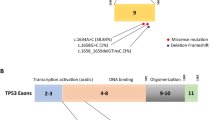Abstract
Hereditary cancer comprises more than 10% of all breast cancer cases. Identification of germinal mutations enables the initiation of a preventive program that can include early detection or preventive treatment and may also have a major impact on cancer therapy. Several recurrent mutations were identified in the BRCA1/2 genes in Jewish populations however, in other ethnic groups in Israel, no recurrent mutations were identified to date. Our group established panel sequencing in cancer patients to identify recurrent, founder, and new mutations in the heterogeneous and diverse populations in Israel, We evaluated five breast cancer patients of Arab descent diagnosed with cancer before the age of 50 years and identified the previously described TP53 mutation, c.541C>T, R181C (rs587782596), in two women from unrelated Arab families. The two probands were diagnosed with breast cancer at a young age (27 and 34 years) and had significant family history spanning a wide range of tumors (breast cancer (BC), papillary thyroid cancer, glioblastoma multiform (GBM), colon cancer and leukemia). The R181C variant is expected to disrupt p53 at the ASPP2 binding domain but not the DNA binding domain and is defined by Clinvar as likely pathogenic and in HGMD as disease mutation. We further tested 85 unrelated Arab cancer patients and father of a BC carrier patient for TP53 c.541C>T using a real time polymerase chain reaction (RT-PCR) approach and identified four additional carriers, two with BC one with lung cancer, and the father of a BC carrier patient, diagnosed with GBM. Another carrier suffering from BC was identified using a Myriad panel, suggesting a recurrent mutation in this population with a frequency of 5/42 (11.9%) of our selected BC patients. We suggest testing Arab women with a breast cancer at a young age, Arab patients with multiple malignancies, or with suggestive family history for TP53 c.541C>T.


Similar content being viewed by others
References
Walsh T et al (2010) Detection of inherited mutations for breast and ovarian cancer using genomic capture and massively parallel sequencing. Proc Natl Acad Sci USA 107(28):12629–12633
Robson M, Offit K (2007) Clinical practice. Management of an inherited predisposition to breast cancer. N Engl J Med 357(2):154–162
Easton DF et al (2015) Gene-panel sequencing and the prediction of breast-cancer risk. N Engl J Med 372(23):2243–2257
Bougeard G et al (2015) Revisiting Li-Fraumeni syndrome from TP53 mutation carriers. J Clin Oncol 33(21):2345–2352
Harris CC, Hollstein M (1993) Clinical implications of the p53 tumor-suppressor gene. N Engl J Med 329(18):1318–1327
Rennert G et al (2007) Clinical outcomes of breast cancer in carriers of BRCA1 and BRCA2 mutations. N Engl J Med 357(2):115–123
Lerer I et al (1998) The 8765delAG mutation in BRCA2 is common among Jews of Yemenite extraction. Am J Hum Genet 63(1):272–274
Sagi M et al (2011) Two BRCA1/2 founder mutations in Jews of Sephardic origin. Fam Cancer 10(1):59–63
Zick A, Cohen S, Hamburger T, Goldberg Y, Zvi N, Sagi M, Peretz T (2016) A BRCA1 frame shift mutation in women of kurdish Jewish descent. Open Med J 3:31–36
Goldberg Y et al (2015) Genetic features of Lynch syndrome in the Israeli population. Clin Genet 87(6):549–553
Goldberg Y et al (2010) An Ashkenazi founder mutation in the MSH6 gene leading to HNPCC. Fam Cancer 9(2):141–150
Salmon A et al (2007) Rapid development of post-radiotherapy sarcoma and breast cancer in a patient with a novel germline ‘de-novo’ TP53 mutation. Clin Oncol (R Coll Radiol) 19(7):490–493
Kadouri L et al (2007) A novel BRCA-1 mutation in Arab kindred from east Jerusalem with breast and ovarian cancer. BMC Cancer 7:14
Registry INC (2016) Breast cancer, invasive (Gender and Subpopulation)—Cancer Incidence trends 1980–2013. https://www.health.gov.il/UnitsOffice/HD/ICDC/ICR/CancerIncidence/Pages/Breast_Invasive.aspx
Chouchane L, Boussen H, Sastry KS (2013) Breast cancer in Arab populations: molecular characteristics and disease management implications. Lancet Oncol 14(10):e417–e424
Nissan A et al (2004) Clinical profile of breast cancer in Arab and Jewish women in the Jerusalem area. Am J Surg 188(1):62–67
El Saghir NS et al (2015) BRCA1 and BRCA2 mutations in ethnic Lebanese Arab women with high hereditary risk breast cancer. Oncologist 20(4):357–364
Laitman Y et al (2011) Germline mutations in BRCA1 and BRCA2 genes in ethnically diverse high risk families in Israel. Breast Cancer Res Treat 127(2):489–495
Yablonski-Peretz T et al (2016) Screening for germline mutations in breast/ovarian cancer susceptibility genes in high-risk families in Israel. Breast Cancer Res Treat 155(1):133–138
Sidransky D et al (1992) Inherited p53 gene mutations in breast cancer. Cancer Res 52(10):2984–2986
Wang PY et al (2013) Increased oxidative metabolism in the Li-Fraumeni syndrome. N Engl J Med 368(11):1027–1032
Slee EA, O’Connor DJ, Lu X (2004) To die or not to die: how does p53 decide? Oncogene 23(16):2809–2818
Smith PD et al (1999) Novel p53 mutants selected in BRCA-associated tumours which dissociate transformation suppression from other wild-type p53 functions. Oncogene 18(15):2451–2459
Monti P et al (2011) Dominant-negative features of mutant TP53 in germline carriers have limited impact on cancer outcomes. Mol Cancer Res 9(3):271–279
Andrade KC et al (2016) Early-onset breast cancer patients in the South and Southeast of Brazil should be tested for the TP53 p.R337H mutation. Genet Mol Biol 39(2):199–202
Villani A et al (2011) Biochemical and imaging surveillance in germline TP53 mutation carriers with Li-Fraumeni syndrome: a prospective observational study. Lancet Oncol 12(6):559–567
Acknowledgements
This research was supported in part by THE ISRAEL SCIENCE FOUNDATION (Grant No. 1985/13). And in part by the Sharett institute of oncology Fund. We want to thank Dr Lerer for all her help and support.
Author information
Authors and Affiliations
Corresponding author
Rights and permissions
About this article
Cite this article
Zick, A., Kadouri, L., Cohen, S. et al. Recurrent TP53 missense mutation in cancer patients of Arab descent. Familial Cancer 16, 295–301 (2017). https://doi.org/10.1007/s10689-016-9951-z
Published:
Issue Date:
DOI: https://doi.org/10.1007/s10689-016-9951-z




